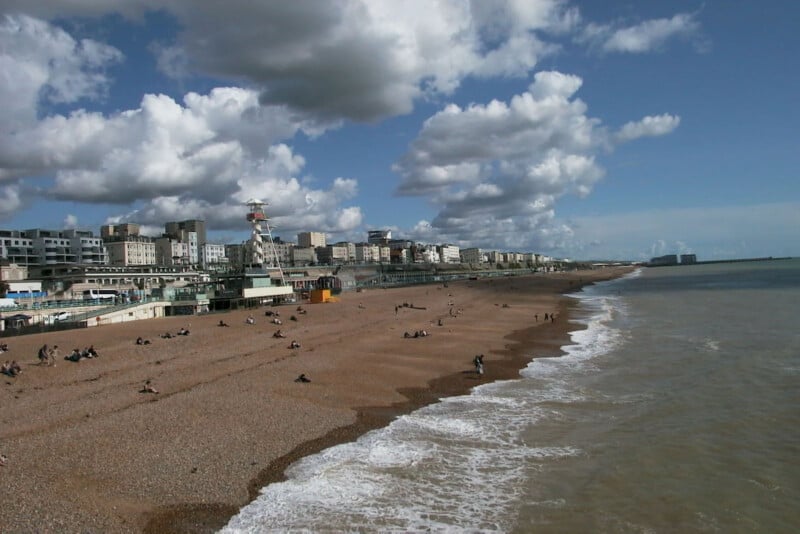A Look Back at Canon’s First Serious Digital Camera, the PowerShot Pro70
![]()
The Canon PowerShot Pro70’s SLR-style appearance may not seem out of the ordinary now, but when it hit store shelves in 1998, it represented a significant departure for Canon. Photographer and vintage digital camera enthusiast Gordon Laing of Camera Labs has tested the influential Pro70 in the latest edition of Laing’s excellent “Retro Review” series.
The PowerShot Pro70 launched for around $1,200 in November 1998 — more than $2,250 in today’s dollars. While that seems very expensive for a bridge camera now, the price served as a stopgap between entry-level cameras and the extremely pricey DSLR cameras of the day, which is a market Canon had yet to enter — the Canon EOS D30 was still a couple of years away.
The Pro70 aimed to serve the burgeoning prosumer digital camera market and it is a camera Laing has long wanted to add to his collection. After a lengthy search, he found a working camera for less than $30; all it needed was a fresh battery.
Not only does Laing consider the Pro70 camera Canon’s first digital camera designed for prosumer enthusiast photographers, but he also argues that it reflected a turning point for Canon as a whole. After launching the PowerShot 600, an “uninspired chunk of a camera,” in 1996, and the rehashed 600N the following year, “something changed” in 1998. It was “arguably the first year Canon took consumer digital photography seriously.”

“[The PowerShot A5 ] launched a series of attractive compacts inspired by the IXUS range of APS film cameras, while the Pro70 targeted the higher-end with a raft of features to delight professionals and enthusiasts alike,” writes Laing.
Although a pro in 2023 will scoff at the Pro70’s 1.7-megapixel sensor, it was no slouch in the late 20th century. The camera’s 28-70mm lens delivers a compelling focal length range, and the camera even sported a flip screen and RAW image recording capabilities.
“In order to appeal to a higher-end market, the Pro70 is equipped with a decent quality zoom lens with a 2.5x optical range equivalent to 28-70mm; this means the Pro70 provides wider coverage than most rival digicams which generally start closer to 35mm equivalent or even narrower. A key benefit of this camera,” explains Laing.

The built-in zoom lens uses a motorized mechanism and is internally zooming, so there are no extending or moving parts. This makes the included 37mm filter thread more useful, as the end of the lens doesn’t move or rotate during use.
The camera’s SLR-style design holds up to this day, and there are aspects of the body that don’t look old-fashioned even now, 25 years later. The body includes numerous physical controls, an optical viewfinder, and a fully articulated 1.8-inch display, which is unfortunately not backlit. Laing notes that the camera lacks a built-in flash, but its hot shoe is compatible with Canon speedlights.

“The PowerShot Pro70 arguably marks the point Canon took prosumer digital photography seriously. Unlike the uninspired models which preceded it in the PowerShot range, this was a camera designed to tempt enthusiasts and even pros who couldn’t stretch to the price of a digital SLR,” concludes Laing. Given the camera’s wider-than-usual 28-70mm lens and RAW image capture, the camera truly set itself apart at the time through its distinct features.

The PowerShot Pro70’s image quality and features may not hold up today, and the camera does not have a legendary reputation. Still, it is a model that deserves recognition and celebration not necessarily for what it offers in and of itself but for the path it set Canon on in 1998. The PowerShot Pro series ended somewhat unceremoniously in 2004 with the PowerShot Pro1, an 8-megapixel camera that holds up surprisingly well. The Pro70’s echoes continue to reverberate throughout Canon’s digital camera system to this day. The PowerShot Pro series
Gordon Laing’s complete Canon PowerShot Pro70 Retro Review on Camera Labs includes many more hands-on details and sample images. More Retro Review videos are also available on Laing’s YouTube channel, DinoBytes.
Image credits: All images © Gordon Laing, Camera Labs